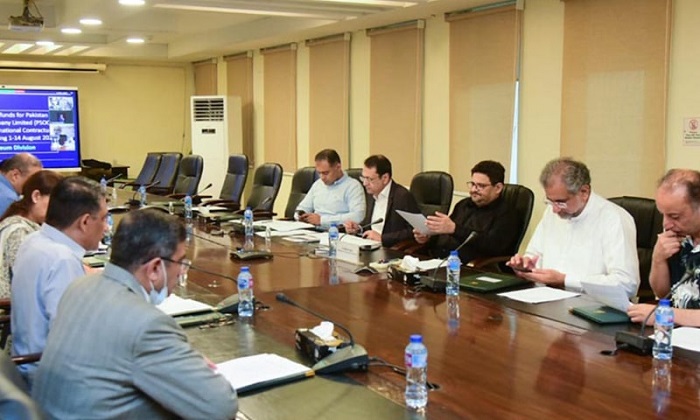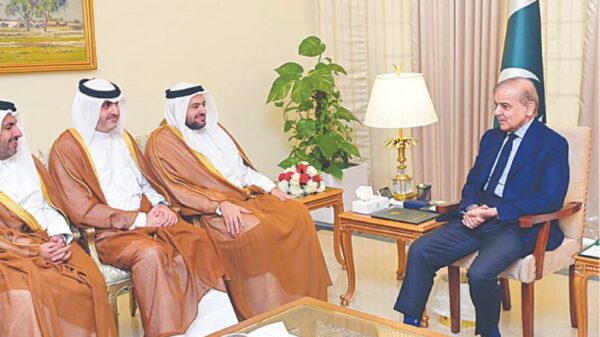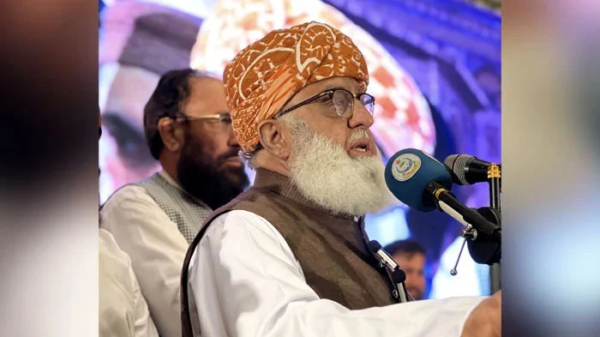On Sunday, Finance Minister Miftah Ismail presided over a special meeting of the Cabinet’s Economic Coordination Committee (ECC).
Additional taxes were necessary to satisfy the IMF’s commitment to a Rs153bn primary budget surplus, the meeting was told.
The ECC has also agreed to examine the possibility of price changes on a weekly or 10-day basis from the current fortnightly pricing.
According to a statement released after the meeting, the ECC “ordered the Finance Division and the Federal Board of Revenue to submit proposals for the creation of Rs30 billion via taxes.”
An additional Rs30bn in supplementary budgetary grant was also allocated for PSO, which has foreign payment commitments of around Rs270bn till August 28.
The ECC decided to clear the overdue payments accumulated during the time of the previous administration in order to ensure the seamless continuance of the oil and gas supply chain and to prevent PSO from defaulting on international payments,” the notification said. This order further ordered the Power Division to pay the present unpaid sum of Rs20 billion within the next 24 hours and an additional Rs12.8 billion by August 4th (Thursday).
According to sources in the Petroleum Division, PSO’s receivables reached Rs608 billion on July 28, including Rs340 billion from Sui Northern Gas Pipelines Limited alone. Since July 1, 2021, there has been a financial shortage of Rs213bn as a result of the supply of LNG. SNGPL’s receivables have escalated from Rs43 billion to Rs113 billion since January 1, 2022, as a result of CPPA’s delayed payments (CPPA). Since July 1, 2022, CPPA has owed PSO an additional Rs182 billion in direct fuel supply payments, including Rs16 billion accrued since that date.
The secretary of petroleum said that PSO had been making SOS calls in order to avoid international default because of delays in payments by other organizations. Thus, it has been unable to deposit Rs81bn into the government’s local currency (NIDA) account for onward transfer to Kuwait Petroleum Cooperation (KPC), which is contractual requirement.
As a result, PSO was unable to deposit Rs16bn to the government against an integrated term financing certificate (ITFC) facility, which was postponed in order to avoid PSO’s international contractual commitments.
Sales of high-speed diesel (HSD) and petrol have fallen by 28 percent and 32 percent, respectively, that had an impact of Rs69bn on collections, while the rupee’s depreciation against the dollar in July has resulted in a rise in procurement costs of Rs63 billion, according to the meeting. Over the years, PSO is said to have lost roughly Rs85bn in foreign exchange, and Rs55bn of it is still outstanding.
Although PSO had met its contractual international payments in July of 2022, “this will not be achievable in August,” according to the statement made at the meeting, which will causing disruption in the supply chain.
In the first two weeks of August 2022, PSO must make an overseas payment of Rs267bn. The estimated revenue for the first two weeks of August was Rs157 billion, resulting in a shortfall of Rs100 billion.
A total of Rs133 billion in payments was requested by the petroleum division, but the finance ministry noted that “no budgetary allocation in the current fiscal year” for this account.
Consequently, a Rs30bn supplemental grant was allowed against a need for Rs54bn, which would be recorded as expenditure and then matched taxes would be created to compensate for the loss of income in order to “reach primary balance agreed with the IMF.
Pakistan’s National Bank of Pakistan (NBP) and other banks would be ordered to provide credit limits to PSO and SNGPL on an emergency basis to cover the remaining Rs45 billion in financing.
Other possibilities for fixing petroleum product pricing have also been ordered by the ECC to be worked up by the Petroleum Division and OGRA within a week. To control the rates of kerosene oil and light diesel oil, the ECC requested a proposal from Petroleum Division within one week after holding consultations with important players in the industry.










